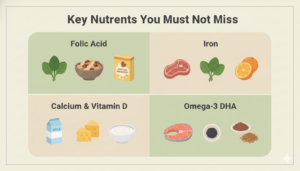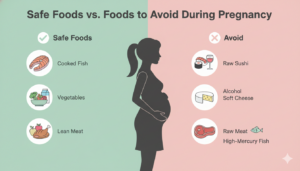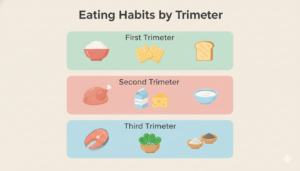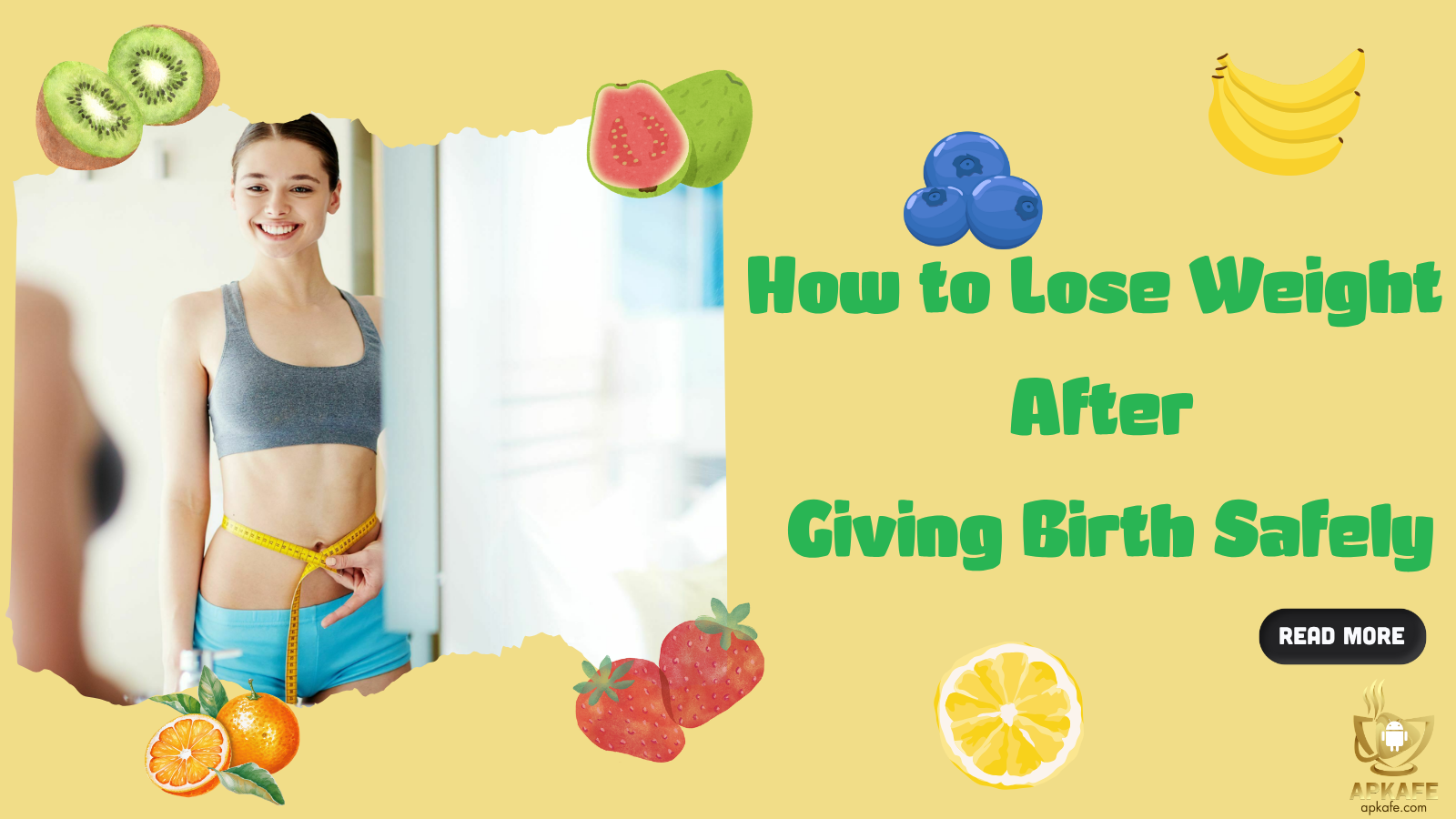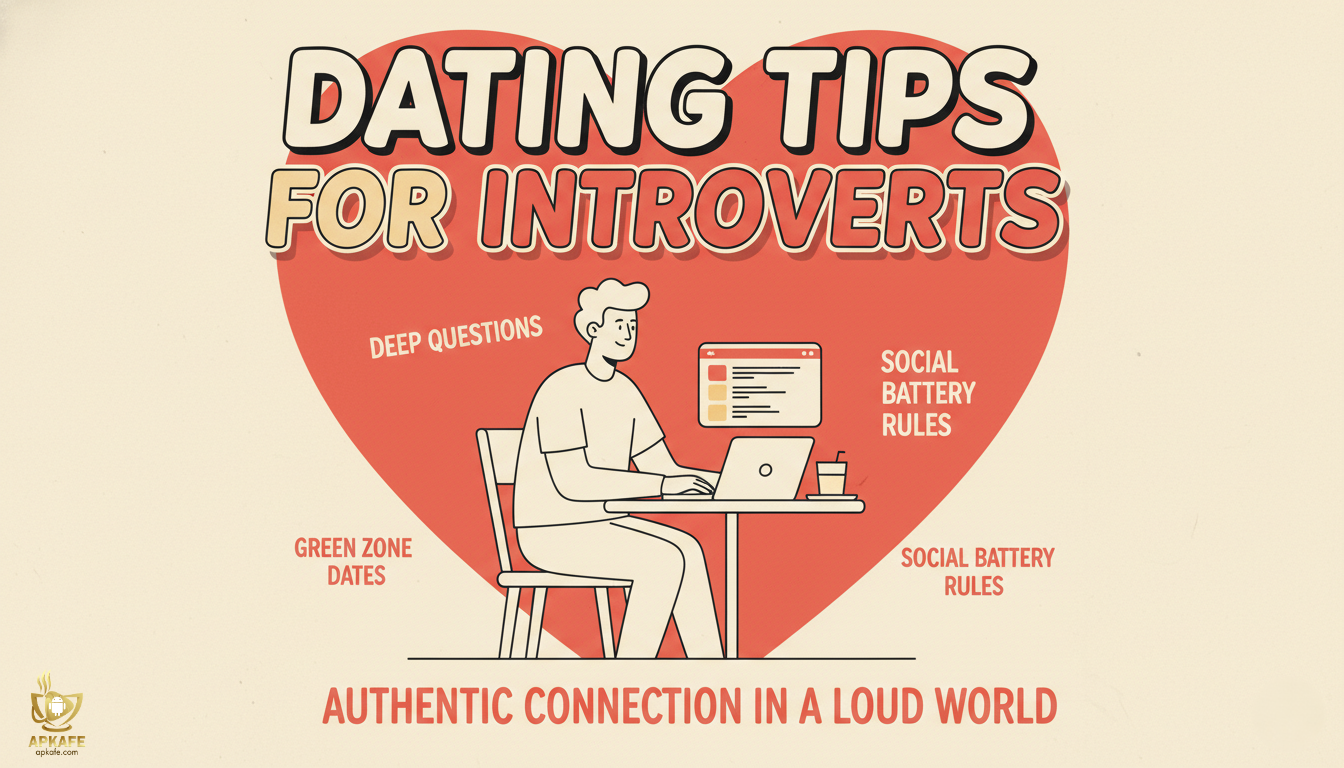Healthy Eating Habits During Pregnancy: What to Eat, What to Avoid, and a Sample Meal Plan
Pregnancy isn’t about “eating for two” — it’s about eating right and nutrient-dense. A healthy diet during pregnancy helps your baby grow strong, keeps you energized, supports proper weight gain, and reduces foodborne risks. This pregnancy nutrition guide will give you simple daily habits, must-have nutrients, foods to eat and avoid, and an easy balanced meal plan for pregnancy. Whether you’re in your first trimester or nearing your due date, you’ll learn how to nourish your body with confidence and joy.
Why Nutrition Matters During Pregnancy
What you eat today literally builds your baby’s tomorrow.
Your baby depends 100% on your nutrition for growth and protection. A poor diet can affect both development and delivery outcomes:
- Lack of folate → higher risk of neural tube defects
- Low iron → anemia, fatigue, and slower fetal growth
- Excessive sugar and fat → gestational diabetes or excess weight gain
- Unsafe foods → risk of infections like listeria or toxoplasma
Balanced, mindful eating during pregnancy improves immunity, mental clarity, and long-term postpartum recovery.
Core Healthy Eating Principles for Pregnant Women
By mastering a few food principles, you’ll feel stronger, lighter, and more confident every day.
Eat a Variety of Whole, Minimally Processed Foods
Choose colorful fruits, leafy greens, and whole grains such as brown rice, oats, and quinoa. Add lean proteins like chicken, lentils, or cooked fish to build your baby’s organs and tissues.
Prioritize Nutrient-Dense Foods
Pick foods rich in folate, iron, calcium, and omega-3. Fresh, local produce beats ultra-processed items high in sugar or sodium.
Eat Small, Frequent Meals
Eating 5–6 small meals daily stabilizes energy, prevents heartburn, and reduces nausea. Healthy snacks—like yogurt, nuts, and fruit—support blood sugar control.
Pro tip: Keep almonds or crackers handy for mid-morning hunger.
Stay Hydrated
Drink 8–10 cups of water every day to support digestion and nutrient transport. Limit sugary drinks and caffeine.
Micro-tip: Add lemon or mint to water for flavor variety.
Read Labels & Choose Pasteurized Products
Ensure milk, cheese, and juices are pasteurized. Avoid old deli meats, soft cheeses, or long-stored foods.
Key Nutrients You Must Not Miss
Each bite can build stronger cells, smarter brains, and healthier bones.
Folic Acid / Folate
- Why: helps prevent neural tube defects, especially in the first weeks.
- Where to get it: dark leafy greens, beans, peas, lentils, and fortified breakfast cereals.
- Still take your prenatal vitamin — diet alone rarely hits the full requirement.
Iron
- Why: builds extra red blood cells for you and the baby; protects against anemia.
- Sources: fully cooked red meat, lentils, spinach, fortified cereals.
- Pro tip: pair iron with vitamin C (citrus, bell pepper) to absorb more.
Calcium & Vitamin D
- Why: support bone and teeth formation for the baby and protect mom’s bones.
- Sources: pasteurized milk, yogurt, cheese, or calcium-fortified plant milks, plus vitamin-D-fortified foods.
Omega-3 (Especially DHA)
- Why: vital for baby’s brain and eye development.
- Sources: fully cooked, low-mercury fish such as salmon, cod, or shrimp (2 portions/week), plus plant sources like chia or flax. NHS and CDC both still tell moms to limit high-mercury species.
Fiber
- Why: relieves pregnancy-related constipation and supports healthy weight gain.
- Sources: whole grains, vegetables, fruits, legumes.
Safe Foods vs. Foods to Avoid During Pregnancy
You don’t have to give up everything—just know what’s safe.
Safe & Recommended Foods
- Cooked lean meats
- Fully cooked low-mercury fish (salmon, sardines)
- Pasteurized dairy and cheese
- Well-washed fruits and vegetables
- Whole grains and legumes
Foods to Limit or Avoid
- High-mercury fish: shark, swordfish, king mackerel
- Raw or undercooked meat, fish, sushi
- Unpasteurized milk, soft cheeses
- Deli meats not reheated
- Alcohol (none)
- Caffeine ≤ 200 mg/day (~1 small coffee)
Food Safety Habits
- Wash hands, boards, and knives before cooking
- Store perishable foods below 40°F (5°C)
- Eat freshly prepared meals
- Avoid leftovers beyond 2 days
Eating Habits by Trimester
Each trimester brings new needs—your meals should evolve too.
First Trimester (Manage Nausea)
- Eat small, bland meals like toast or bananas
- Avoid strong smells
- Maintain folic acid intake
Second Trimester (Growth Phase)
- Increase protein and calcium
- Add more whole grains and colorful fruits
Third Trimester (More Heartburn, Higher Demand)
- Eat smaller, frequent meals
- Focus on iron and DHA
- Stay hydrated between meals
1-Day Healthy Pregnancy Meal Plan (Example)
- Breakfast: Oatmeal + yogurt + berries + nuts
- Snack: Apple + peanut butter
- Lunch: Brown rice + baked salmon (fully cooked) + steamed veggies
- Snack: Greek yogurt + chia seeds
- Dinner: Grilled chicken + sweet potato + salad (olive oil)
- Evening: Warm pasteurized milk
If you don’t eat fish: Replace with chia, flax, or walnuts, and consider doctor-approved omega-3 supplements.
Pregnancy Nutrition Quick-Compare Table
| Goal / Need | Key Nutrients | Best Sources | Safe Apps to Track or Learn More | Pro Tip |
|---|---|---|---|---|
| Baby’s brain & eyes | Omega-3 (DHA) | Salmon, chia, flax | Yazio | 2 servings/week |
| Prevent defects | Folic Acid | Greens, beans, cereals | MyNetDiary | Take prenatal folate daily |
| Strong bones | Calcium + D | Dairy, fortified milk | Fooducate | Get sunlight daily |
| Prevent anemia | Iron + C | Meat, spinach, citrus | Cronometer | Pair spinach with citrus |
| Control cravings | Fiber + Protein | Whole grains, nuts | Noom | Eat every 3 hours |
| Stay hydrated | Water + Electrolytes | Water, soups | Fitbit | Set hydration alerts |
Pregnancy Eating Safety & Privacy Checklist
| Check Before You Eat or Track | Why It Matters |
|---|---|
| Pasteurized label on dairy | Prevents listeria |
| Avoid raw meat/fish | Reduces illness risk |
| Wash fruits/veggies | Removes bacteria |
| Use secure health apps | Protects data |
| Review app permissions | Prevents data misuse |
| Store food below 40°F (4°C) | Keeps freshness |
| Reheat leftovers hot | Kills bacteria |
Conclusion
Healthy eating during pregnancy doesn’t have to be complicated, it just has to be consistent, safe, and nutrient-dense. If most of your meals come from whole foods (fruits, vegetables, whole grains, lean protein, pasteurized dairy), you stay hydrated, and you avoid the small list of risky foods (high-mercury fish, raw or unpasteurized products), you’re already doing what current pregnancy nutrition guidelines recommend.
From here, talk to your doctor about prenatal vitamins, adjust portions by trimester, and keep a simple meal plan on hand so you don’t have to guess every day. A well-fed mom means a well-growing baby, that’s the real goal.
FAQs About Eating During Pregnancy
Can I drink coffee while pregnant?
Yes, but keep it under 200 mg caffeine/day.
Is fish safe?
Yes, if cooked and low in mercury—salmon, sardines, trout.
Do I still need prenatal vitamins?
Yes. They ensure folate, iron, and calcium sufficiency.
How much weight should I gain?
Around 25–35 lbs (11–16 kg), depending on your BMI.
Can I eat out?
Yes—order freshly cooked meals, skip raw foods.
User Reviews

